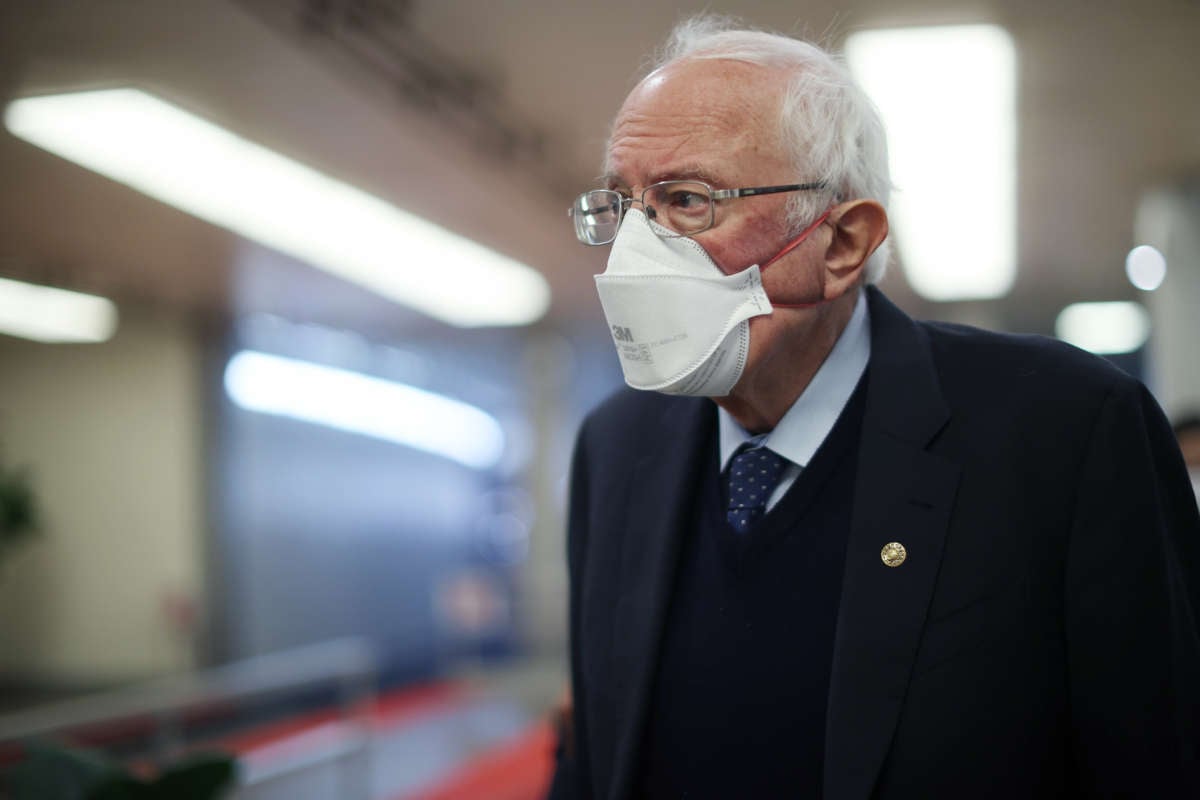Honest, paywall-free news is rare. Please support our boldly independent journalism with a donation of any size.
The Congressional Budget Office said Monday that raising the federal minimum wage to $15 an hour would have a significantly broader budgetary impact than two provisions of the 2017 Republican tax cut legislation that passed through reconciliation, a finding that provides another boost to Sen. Bernie Sanders’ effort to include the pay increase in the Senate coronavirus relief package.
In response to a request by Sanders — the chairman of the Senate Budget Committee — for a comparison of the budgetary effect of the Raise the Wage Act of 2021 with that of the GOP tax bill’s zeroing out of Obamacare’s individual mandate penalty and the measure’s Arctic National Wildlife Refuge (ANWR) drilling provision, the CBO found that the $15 minimum wage legislation would have a more sweeping impact.
“The analysis of the Raise the Wage Act encompasses a much broader range of behavioral effects than that of the 2017 tax act, and the increased minimum wage would in turn affect a broader range of budget functions than CBO estimated that the change in the mandate penalty would,” the budget office noted in a letter (pdf) to Sanders. “Increasing the minimum wage would affect more budget functions than CBO estimated that the ANWR provisions would.”
Under the Senate’s so-called Byrd Rule, each provision of a reconciliation bill must have a direct — not “merely incidental” — impact on the federal spending and revenue. The CBO’s latest analysis — which comes a week after the budget office found the wage hike would add $54 billion to the deficit over ten years — was viewed as additional confirmation that the wage increase should qualify under reconciliation.
“Sounds like a passing grade to me, folks,” said Elizabeth Pancotti, policy director at Employ America, in response to the CBO analysis.
Warren Gunnels, Sanders’ staff director, also welcomed the CBO’s new findings in a tweet late Monday.
“Raising the minimum wage to $15 would have a much bigger impact on the federal budget than oil drilling in the Arctic and the repeal of individual mandate penalties,” Gunnels noted. “Both of those provisions were deemed permissible under reconciliation. Let’s go.”
CBO to Budget Chair Bernie Sanders: Raising the minimum wage to $15 would have a much bigger impact on the federal budget than oil drilling in the Arctic & the repeal of individual mandate penalties. Both of those provisions were deemed permissible under reconciliation. Let’s go. https://t.co/ljzVkg0oIo
— Warren Gunnels (@GunnelsWarren) February 16, 2021
The CBO analysis came as Sanders is working to make the case to the Senate parliamentarian — and to skeptical Democrats, including President Joe Biden and Sen. Kyrsten Sinema (D-Arizona) — that the Raise the Wage Act complies with reconciliation rules and thus can and must be included in the Senate’s coronavirus relief package.
In an appearance on CNN late Monday, Sanders said he “absolutely” believes that raising the federal minimum wage to $15 an hour is “consistent with the rules of the Senate and the reconciliation process,” a procedural tool Democrats are using to pass a coronavirus relief package without the support of obstructionist Republicans.
“A living wage, 15 bucks an hour, it is popular. It’s what the people want ,it is what justice demands. So I’m gonna fight as hard as I can”
–@SenSandersCall your Senators: 888-639-5155#RaiseTheWage #FightFor15 pic.twitter.com/KNXmQj96IP
— Fight For 15 (@fightfor15) February 16, 2021
“When you have half of the people in this country living paycheck to paycheck, and all over this country you’re having workers trying to survive on $9 or $10 an hour or even less than that — the American people…Republicans, Democrats, Independents want to raise the minimum wage to a living wage, 15 bucks an hour,” said Sanders.
“It is popular, it is what the people want, it is what justice demands,” the Vermont senator added. “So I’m gonna fight as hard as I can, and I believe that we will succeed in including the minimum wage in the reconciliation bill.”
Press freedom is under attack
As Trump cracks down on political speech, independent media is increasingly necessary.
Truthout produces reporting you won’t see in the mainstream: journalism from the frontlines of global conflict, interviews with grassroots movement leaders, high-quality legal analysis and more.
Our work is possible thanks to reader support. Help Truthout catalyze change and social justice — make a tax-deductible monthly or one-time donation today.
